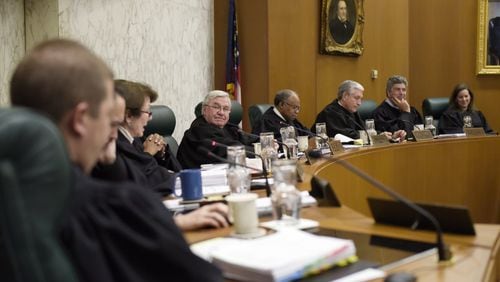Georgia’s legislators may pass any law they wish — a ban on interracial marriage, for example, or a law against gun ownership, or a prohibition against Christians holding office — and no one may challenge them in any state court.
The state Attorney General’s Office takes that surprising argument before the Georgia Supreme Court on Monday in a hearing on the state’s “fetal pain” law. Citizens, the attorney general says, may challenge such laws in state court only if the Legislature has specifically granted them permission to do so.
As controversial as the “fetal pain” statute is — it bans almost all abortions after 20 weeks — the dispute has implications far beyond abortion law and could result in one of the most consequential decisions by the state’s highest court in decades.
At issue is the doctrine of sovereign immunity, rooted in the centuries-old English principle that “the king can do no wrong.” Sovereign immunity protects governments at all levels from being sued without their consent.
“The foremost principle governing the three branches of government is the system of checks and balances,” said Atlanta lawyer Don Samuel, who represents three doctors challenging the state’s “fetal pain” law. “Under the state’s argument, the Legislature, not the state Supreme Court, is the final arbiter of the Bill of Rights. It reverses who’s supposed to be in charge.”
State attorneys argue, however, that courts may not review challenges to laws when they have no jurisdiction to do so, and that’s the case here because the state has not given its consent to such a constitutional challenge.
“If the public interest in avoiding occasional harsh or unfair results outweighs the public interest in sovereign immunity, the people of Georgia through their representatives can waive (it) by legislative enactment,” the state AG’s office told the state Supreme Court.
Through a spokeswoman, Attorney General Chris Carr declined to comment.
Georgia’s ‘fetal pain’ law of 2012
In 1973, the U.S. Supreme Court upheld a woman’s right to abortion until the time a fetus is viable — now considered to be about 24 weeks after conception. But a 2012 state law says Georgia has an interest in protecting fetuses after 20 weeks because they are capable of feeling pain.
The law says doctors who perform abortions after the 20-week threshold can be charged with a felony and face up to 10 years in prison. It also gives district attorneys access to abortion patients’ medical records.
The doctors’ suit contends the “fetal pain” law violates the state’s constitutional right to privacy.
The attorney general’s office says Georgia’s Constitution is clear and unambiguous. As for the doctors’ case: “The right to privacy does not contain a waiver of sovereign immunity.”
State attorneys suggest there are other ways to challenge an illegitimate law. They cite the 1998 case of Anthony Powell, whose appeal overturned the state’s anti-sodomy law after he was convicted and sentenced to prison.
Under this scenario, the abortion doctors could challenge the fetal-pain law after being charged for violating it.
“Obviously, you shouldn’t have to take such a chance of having to wait until you’re arrested,” University of Georgia law professor Michael Wells said. “That’s a pretty perilous proposition.”
Georgians who believe a state law violates the U.S. Constitution may sue in federal court, where sovereign immunity does not necessarily apply. But federal claims are not always available, Wells said.
Strange bedfellows in lawsuit
The high-stakes nature of the abortion case is laid out in a brief jointly filed by four nonprofits with profoundly divergent interests: the Southern Center for Human Rights, dedicated to protecting the rights of people in the criminal justice system; GeorgiaCarry.Org, an advocate for the right to bear arms; the Goldwater Institute, which advances the principles of limited government; and the Anti-Defamation League, which advocates for individual religious liberty.
“If sovereign immunity were expanded as the state proposes, the time-honored tradition of public interest litigation in defense of individual rights will cease to exist in Georgia,” the groups said.
Last year, a Fulton County judge dismissed the abortion doctors’ suit on sovereign immunity grounds, citing a 2014 precedent set by the Georgia Supreme Court. In that ruling, the high court barred a lawsuit filed by an environmental group, the Center for a Sustainable Coast, that sought to stop the state from allowing construction along protected shorelines in Glynn County.
Sovereign immunity has been embedded in Georgia law for more than two centuries, dating to 1784. And state and local governments have successfully raised sovereign immunity defenses in a host of cases in recent years.
In 2015, for example, the state high court said sovereign immunity barred a lawsuit against the Board of Regents that contended immigrants without legal status should pay substantially lower in-state tuition rates at the state’s public colleges and universities.
Writing for the court, Justice Harold Melton suggested plaintiffs could get around sovereign immunity by filing suits against government employees in their personal, not official, capacities.
But Atlanta plaintiffs’ lawyer Lee Parks called this suggestion untenable.
“Why subject regular government employees to a lawsuit when all they’re doing is following or enforcing a law that may be unconstitutional?” he asked. “In other words, they’re being sued for just doing their job. What’s the sense in that?”
‘Unprecedented judicial intrusion’
Last year, state lawmakers, concerned about the ramifications of the Sustainable Coast ruling, introduced legislation to allow lawsuits challenging the constitutionality of state laws or local ordinances.
Credit: Curtis Compton
Credit: Curtis Compton
“We wanted to put us back to where we thought we needed to be,” said state Rep. Wendell Willard, R-Sandy Springs, who sponsored the bill.
“That’s allowing the courts to be able to look at what came out of the Legislature and letting judges issue temporary injunctions if they were necessary or give people the chance to go into court and having a judge decide if a law was unconstitutional.”
Both the House and the Senate overwhelmingly passed House Bill 59 and sent it to the governor for his signature. Instead, Gov. Nathan Deal vetoed it, saying the Legislature went too far.
“This sweeping waiver of sovereign immunity would allow unprecedented judicial intrusion into daily management decisions entrusted to the executive branch of government,” Deal said when explaining his veto.
Lawmakers are expected to take up the issue again this session.
‘To me, it’s not even a close call’
While serving as state attorney general, Mike Bowers helped draft the 1991 constitutional amendment that has been relied upon by his successors to thwart lawsuits against government agencies.
In an interview last week, Bowers said he didn’t anticipate the amendment could ultimately bar suits challenging the constitutionality of state laws.
“There is virtually no way for citizens to force their government to obey the law in Georgia today, given the Sustainable Coast decision by the Georgia Supreme Court and because there’s no legislation to overcome sovereign immunity,” Bowers said.
“Is it more important to save money defending lawsuits or is it more important to be able to hold our government accountable so it obeys the law? To me, it’s not even a close call.”
SOVEREIGN IMMUNITY’S HISTORY
Sovereign immunity has been part of Georgia law for 233 years.
In 1983, a constitutional amendment said state and local agencies waived sovereign immunity if they bought liability insurance. That changed with a constitutional amendment in 1991, which said sovereign immunity may only be waived by an act of the General Assembly.
That 1991 amendment is at the center of Monday’s Supreme Court hearing: must the Legislature specifically waive sovereign immunity on this law or that to enable legal challenges to that law?
Since 1991, the Legislature has enacted a number of limited waivers. It allowed for breach-of-contract lawsuits against government agencies as well as tort claims, such as suits seeking damages for injuries in a car crash caused by an official driving a state vehicle.









